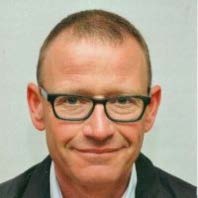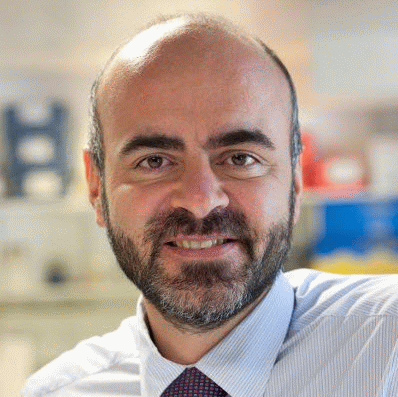UCL Institute of Child Health Inaugural Symposium, 9 June 2015
Date and time
Location
Kennedy Lecture Theatre
UCL Institute of Child Health 30 Guilford Street London WC1N 1EH United KingdomDescription

You are warmly welcomed to attend the inaugural symposium of Professor Mark Peters and Professor Paolo de Coppi:
Inaugural Symposium
Kennedy Lecture Theatre, UCL Institute of Child Health
Tuesday 9 June 2015
Programme:
3.00pm Professor Mark Peters, Professor of Paediatric Intensive Care
Title:"Fortune's Fool"
4.00pm Tea on Balcony
4.30pm Professor Paolo de Coppi, NIHR Professor of Paediatric Surgery
Title: "Harvesting: from crops to cells and organs"
5.30pm Drinks reception on Balcony
" Fortune's Fool"

Professor Mark Peters
Abstract
Paediatric Intensive Care Units are crucial to child health. Our best estimate is that without them the childhood mortality rate in the UK would double. Outcomes for paediatric critical illness continue to improve dramatically, while demand for our services grows at around 5% a year. Extraordinarily, this has been achieved without a formal research base. UCL appointing a first UK research-based Chair in Paediatric Intensive Care Medicine is therefore hugely significant for our speciality.
Shakespeare repeatedly uses the phrase ‘Fortune’s Fool ‘as shorthand for chance, luck, randomness or the effects of variability. My appointment here results from a series of random events and no small amount of extraordinary luck. It could, and probably should, have been an honour for one of my many mentors. Perhaps I should not be surprised; after all Intensivists live in an environment surround by apparent randomness and variability and chance.
Variability and our response to it fascinating. Children respond to a similar life-threatening insults in dramatically varying ways. Our treatments normalise some abnormal physiological parameters while tolerating others. We have little or no evidence for these decisions. My research seeks to characterise patients by their responses, to generate empirical data from clinical trials of basic interventions, and also to understand and work around some of our biases in our responses. I suspect that we need a new, more welcoming attitude to physiological variability and share the concept of ‘antifragility’.
Biography
Mark Peters studied Medicine at the University of Bristol graduating in 1989. Post-registration he worked in Adult Medicine in Oxfordshire before returning to Bristol to start paediatric training. In both these early roles he found himself drawn to the more data rich analytic environments of the intensive care units. Post-membership he came to GOSH as an SHO 1993 to work for Drs Morgan and Novelli in Immunology and Infectious Diseases on the long-demolished Cohen ward. Experiences there – and particularly uncertainty about fluids, resuscitation and the role of positive pressure ventilation in immunodeficiency amongst the many Immunology cases that made a one-way trip to the ICUs, reinforced his enthusiasm for ICU. Critical Care was just becoming a standalone speciality growing out from the Respiratory team under the pioneers of Duncan Matthews and Bob Dinwiddie. He joined the PICU team as the VCB building opened, worked as one of the first team on ICU registrars on the CICU and became ICU’s first research fellow in 1995 under the supervision of Nigel Klein and Robert Tasker thanks to support from Portex and Professor David Hatch. He was appointed a consultant intensivist in 2000 and slowly built a research team during a full-time clinical role including 3 years as Divisional Chair.
His research moved from Immunobiology, especially risk stratification of paediatric critical illness, progressively into clinical trials. The key step was five years ago when he was awarded an NIHR Senior Lectureship that permitted protected research time. Since then he has been supervising 7 PhD students, obtaining more than £4M in grant income (along with another $14M of international collaborative grants), publishing a further 40 peer reviewed papers including contributing to most of the trials in paediatric critical care globally. He has a(largish) handful of papers in the New England Journal of Medicine and The Lancet. He chairs the influential Paediatric Intensive Care Society Study Group and the NIHR Clinical Research Group for Children for Anaesthesia, Cardiology and Critical Care, edits the Paediatric Section of Intensive Care Medicine
In the Chair: Professor Rosalind Smyth, Director UCL Institute of Child Health.
Vote of thanks: Professor Nigel Klein, Professor of Infectious Disease & Immunology, UCL Institute of Child Health.
"Harvesting: from crops to cells and organs"

Professor Paolo de Coppi
Abstract
To follow.
Biography
Paolo De Coppi is the NIHR Professor of Paediatric Surgery and Consultant Paediatric Surgeon at the Great Ormond Street Hospital for Children and the Head of Stem Cells & Regenerative Medicine Section, Developmental Biology& Cancer Programme at the UCL Institute of Child Health, London, UK.
He has a special interest in congenital malformation and their treatment using minimally invasive techniques. He has focused his research interests on stem cells and tissue engineering, trying to find new modalities for the treatment of complex congenital anomalies. While working with Dr A. Atala at the Childrens’ Hospital in Boston-US, he had the opportunity of identifying a new source of cells for therapeutic applications showing the possibility of using stem cells from amniotic fluid. This finding generated an international patent and garnered the cover story of Nature Biotechnology January 2007. He has more recently focused on developing reliable methods for stem cell isolation, expansion and differentiation at a clinical level (GMP-grade). Finally, in 2010 he was part of the team that performed the first successful transplantation of a tissue-engineered trachea on a child at the Great Ormond Street Hospital.
He has published more than 180 peer-reviewed articles in journals such as The Lancet, Nature Biotechnology, PNAS, Blood and Stem Cells; supervised more than 30 research fellow and Ph.D. students; and has been awarded various national and international grants. He is on the editorial boards of Stem Cell Development, Journal of Pediatric Surgery, Pediatric Surgery International, and Fetal and Maternal Medicine Review. As of 2011 he has been the senior associate editor for Stem Cell Translational Medicine.
In the Chair: Professor Rosalind Smyth, Director UCL Institute of Child Health.
Vote of thanks: Mr Edward Kiely, Consultant in Paediatric Surgery, Great Ormond Street Hospital NHS Foundation Trust
RSVP: RESERVE YOUR PLACE BY REGISTERING.
Organised by
The mission of the UCL Great Ormond Street Institute of Child Health is to improve the health and well-being of children, and the adults they will become, through world-class research, education and public engagement.